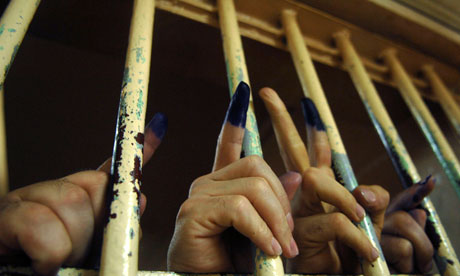The government can equivocate no longer, it is legally obliged to remove the blanket ban on voting behind bars
 Prison inmates in Iraq show their ink-stained fingers after voting in a regional parliament election from behind bars: The UK has yet to bring in voting for prisoners. Photograph: Reuters
Prison inmates in Iraq show their ink-stained fingers after voting in a regional parliament election from behind bars: The UK has yet to bring in voting for prisoners. Photograph: ReutersWhat is the coalition government going to do about votes for prisoners? It's a tricky issue since the Liberal Democrats are known to be more enthusiastic about allowing prisoners to vote than the Conservatives.
That said, the issue is now in the hands of Nick Clegg, the deputy prime minister, so there should be some progress. The government has promised an update by the end of next month.
To some extent, its hands are tied. Five years have passed since the European court of human rights decided that the general, automatic and indiscriminate restriction on voting by convicted prisoners was a breach of the human rights convention.
That was a judgment by the court's grand chamber, which dismissed the government's appeal against a ruling in favour of John Hirst, a prisoner convicted of manslaughter who has since been released on licence. There can be no further appeal.
The ruling does not require Britain to give all prisoners the vote. But it does mean that the government can no longer maintain blanket restrictions on votes by convicted prisoners.
That much is clear from article 46 of the human rights convention, under which the governments that signed it "undertake to abide by the final judgment of the court in any case to which they are parties".
So it was mischievous of Lord Scott of Foscote – the retired law lord perhaps still best remembered for chairing the arms-to-Iraq inquiry in the 1990s – to say in parliament on Monday that "the rulings of the Strasbourg court are not binding on our domestic courts". He is right but he misses the point.
If the English courts were now being asked to decide whether a particular prisoner should be allowed to vote, they would need to do no more than "take into account" what Scott dismissed as "the occasional extravagances of the Strasbourg court".
But, as Lord Lester pointed out, governments have no such choice. They are under an international treaty obligation to abide by the Hirst ruling.
And what if they don't? Enforcement is in the hands of foreign ministers from member states of the Council of Europe, although the work is delegated to officials from each country.
These officials have passed a series of increasingly grumpy resolutions as the Labour government failed over the years to implement the Hirst judgment. At their most recent meeting last month, the ministers' deputies "called upon the United Kingdom to prioritise implementation of this judgment without any further delay".
Under a recent amendment to the human rights convention, the committee of ministers can now refer non-compliance by a state back to the court.
If the court finds a violation, the case goes back to the committee of ministers "for consideration of the measures to be taken". In theory, these measures could include suspension or expulsion from the Council of Europe. In reality, there is no chance that matters would get that far. But it would be highly embarrassing if the UK – which has never before refused to abide by a Strasbourg ruling – became the first country to be referred to the court for non-compliance.
Lord McNally, the justice minister, promised in the House of Lords this week that the government would report to the committee of ministers at its meeting on 30 November. He said the government was considering both the view that the removal of the vote was a proper sanction for someone who has committed a serious crime and the view that granting the vote to certain prisoners was a useful way of rehabilitating them into society.
But the time for considering these two views expired five years ago. What matters now is that Britain should be seen to be complying with its treaty obligations.
The government should now announce that Britain has agreed, in principle, to allow some prisoners the vote. Lester noted that Ireland, Cyprus and Hong Kong have all managed to introduce postal voting for prisoners without the slightest difficulty.
And it would presumably be more acceptable than the other way of abiding with the court's judgment at a time of financial stringency – closing all the prisons.
Joshua Rozenberg is a freelance legal writer, commentator and broadcaster

No comments:
Post a Comment